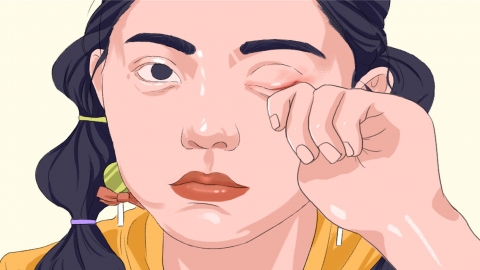Why is the cornea so sensitive?
The high sensitivity of the cornea may be caused by factors such as abundant corneal nerves, lack of a keratinized layer in the cornea, corneal epithelial damage, viral keratitis, and allergic conjunctivitis. If abnormalities occur, timely medical attention is recommended. Detailed explanations are as follows:

1. Abundant corneal nerves: The cornea contains numerous sensory nerve endings directly connected to the trigeminal nerve, allowing for acute perception of external stimuli, which is an important physiological mechanism for protecting the eye. It is important to avoid foreign bodies entering the eye and reduce corneal irritation in daily life.
2. Lack of a keratinized layer: The corneal surface consists of non-keratinized epithelium, which is fragile and highly permeable, making it easier for external stimuli to directly affect nerve endings, thus increasing corneal sensitivity. Eye protection should be emphasized, and eye rubbing should be avoided to prevent corneal damage.
3. Corneal epithelial injury: Trauma or friction can cause damage to the corneal epithelium, exposing nerve endings and resulting in intense foreign body sensation and pain upon stimulation. Doctors may prescribe medications such as recombinant human epidermal growth factor eye drops, sodium hyaluronate eye drops, or eye gel containing deproteinized calf blood extract to promote epithelial healing.
4. Viral keratitis: Viral infection causes corneal inflammation, damaging corneal tissue and stimulating nerve endings, leading to severe eye pain, photophobia, and heightened sensitivity to light and touch. Treatment options may include acyclovir eye drops, ganciclovir ophthalmic gel, or recombinant bovine basic fibroblast growth factor eye drops, as recommended by a doctor.
5. Allergic conjunctivitis: An allergic reaction causing conjunctival inflammation may spread to the periphery of the cornea, resulting in hyperemia and sensitivity of the limbus and causing eye itching. Treatment may involve the use of antiallergic medications such as olopatadine hydrochloride eye drops, sodium cromoglycate eye drops, or fluorometholone eye drops under medical guidance to alleviate allergic reactions and inflammation.
In daily life, maintaining good eye hygiene, avoiding rubbing the eyes with hands, properly protecting the eyes, and preventing foreign bodies from entering the eyes are recommended.











